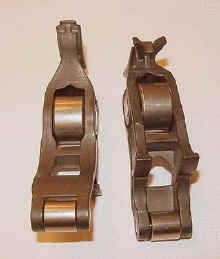|

Top and Bottom Views of the Intermediate Lever Arm with Rollers Installed
|
|
The intermediate lever arm
is a precision component designed to minimize the weight and inertia in
the valve train, but still provide high strength and stiffness.
The lever
arm has to withstand high cyclic stresses and aggressive wear conditions
over the full life of the engine, requiring a steel alloy that has:
-
Ultimate
Tensile Strength = 263 ksi / 1870 MPa
-
Yield Stress
= 242 ksi / 1670 MPa
-
Surface hardness
of 70
Rockwell C measured with
a Vickers microhardness tester
-
Core
hardness of 37 Rockwell C
|